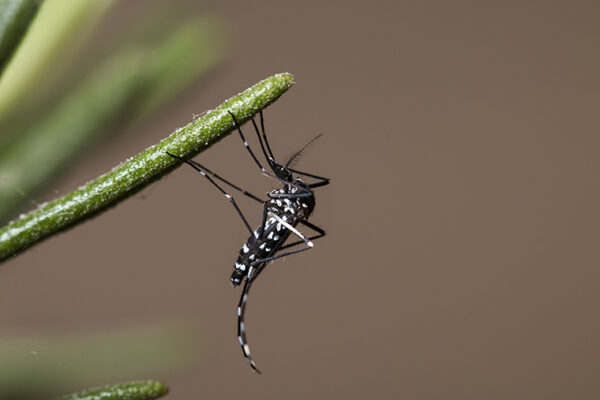In suburban backyards and at family picnic gatherings across the United States, mosquitoes are a common pest.

People are most likely to get bitten by mosquitoes during the warm and lazy summer months, says Katie Westby, vector and disease ecologist at Tyson Research Center, Washington University in St. Louis’ environmental field station in Eureka, Mo. Westby knows this first-hand after years of studying the mosquitoes that are found in abundance in Tyson’s 2,000 acres of oak-hickory forest at the northern edge of the Missouri Ozark region.
Westby is interested in how mosquitoes are adapting to new climates and thriving in modern cities. But many of the people she talks with are more worried about how some mosquitoes can spread disease.
“West Nile virus is endemic in the St. Louis area and there have been a few cases of La Crosse virus in past decades, which primarily affects children,” she said. “Interestingly, there is a relatively rare mosquito-transmitted virus called St. Louis encephalitis virus. Viruses used to be named after the place they were first discovered. So while this may be another claim to fame for our city, it doesn’t mean we have a lot of cases.
“In other regions of the United States, like Florida and Texas, there have been sporadic cases of dengue caused by mosquito bites,” Westby said. “We also see a few cases of Eastern equine encephalitis and Western encephalitis each year. Overall, in the U.S., ticks are responsible for more disease than mosquitoes (e.g., Lyme disease and Rickettsial infections), however.”
Here, Westby offers some hard-earned advice on avoiding bites, and what she does when she gets bitten:
Outside of the lab, how do you protect yourself from getting bitten by mosquitoes?
If I am going to a place where I know there will be a lot of mosquitoes and ticks, I use a 40% DEET repellant and wear long pants and sleeves. I also treat my clothes with permethrin, which is an insect repellant for clothing only that lasts on fabric for several washes and repels and/or kills bloodsuckers. Some mosquitoes, especially forest and swamp species, are large and tough enough to bite through thin clothing, so I do use both physical and chemical repellants.
If I am just hanging out at home, or at a park in the city where skeeters are biting, I typically only apply DEET to my skin and clothes. In my opinion, DEET is hands down the best mosquito repellant.
When shopping for mosquito repellants, what should consumers avoid or be aware of?
You never want to apply permethrin to your skin, and you must allow it to dry completely on your clothing before wearing them. It is unsafe for pets and should be applied to clothing outdoors in a well-ventilated area.
There are no known or significant health risks of using DEET if used as directed. Yes, it’s safe for children, too. That being said, you want to be careful applying it to your face (it will make your lips numb), and it has an unpleasant odor that is off-putting for many people. At my house, we call it our summer cologne.

How do bug sprays work to prevent mosquitoes from biting you?
This is actually still a bit of a mystery that researchers are actively working to resolve. It is believed that DEET works on both odorant receptors, which may confuse mosquitoes or disguise your scent, and chemoreceptors, which repel mosquitoes if they land on you.
Is it true that some people are more prone to mosquito bites than others?
Yes, this is absolutely true! Mosquitoes are attracted to the CO2 we expel as well as the suite of chemicals that our skin exudes, like lactic acid and octanol. Some people appear to have a very delicious mix and will always attract more bites than other people. There are also a lot of other studies that show things like blood type may affect your attractiveness and that certain behaviors, such as drinking beer, can make you more attractive!
Can dogs and cats get bitten by mosquitoes, too?
Yes, pets are a very common source of mosquito blood meals. The biggest risk for your pets is heartworm, which is spread by mosquitoes. If you let your pets outside, I highly recommend getting them a prophylactic for heartworm.
What do you do to reduce itchiness or swelling after you are bitten by mosquitoes?
I use a topical hydrocortisone cream and ice on my bites, and I will take an oral histamine if I really get eaten up.
Do you have any recommendations for how to keep your yard as mosquito free as possible?
Removing water holding containers, or frequently cleaning them, is important to interrupt the mosquito life cycle. The Missouri Department of Conservation has some other helpful suggestions as well. Unfortunately, mosquitoes are also nectar feeders and rest in dense vegetation during the hottest part of the day, so a lush home garden will increase the chances that you will encounter mosquitoes in your yard. This does not stop me from planting lots of native wildflowers, however — because I have that bottle of DEET on my back porch!


